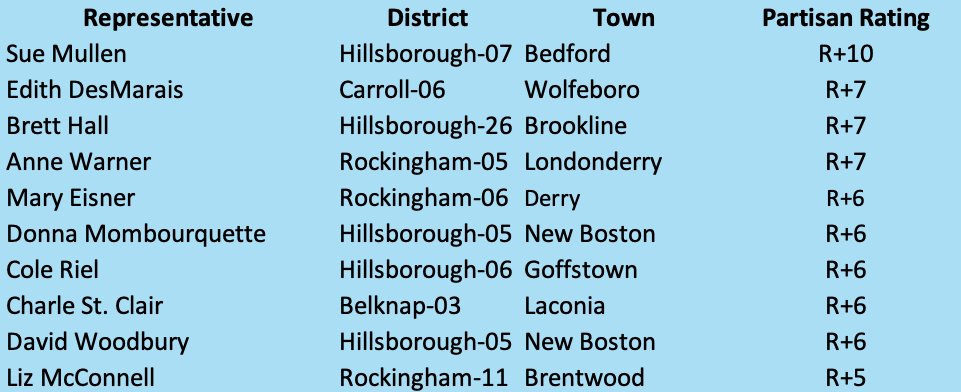The Democratic wave that flipped the New Hampshire legislature from red to blue last year also swept some progressive Democrats into solidly Republican seats. That partisan political reality, however, hasn’t stopped these “Progressive Pioneers” from voting their ideological beliefs, a new analysis by New Hampshire Journal reveals.
Using data from William Tucker at Miscellany Blue ranking House districts by their partisan lean based on the presidential vote in the last two elections, NHJournal identified the 10 most Republican House seats (GOP +5 or more) currently represented by Democrats.
The legislators range from Rep. Liz McConnell, whose Brentwood seat is R +5, to Rep. Sue Mullen in the solidly Republican (R +10) Bedford district. And yet, rather than moderating their views to reflect the voting history of their districts, these legislators cast politically-risky votes in favor of creating new taxes, raising existing ones and supporting unpopular sanctuary city policies.
New Hampshire’s Top Ten “Progressive Pioneers” are:

To provide an objective measurement of their voting records, NHJournal chose eight key votes from this year’s legislative session on issues likely to divide liberal and conservative voters. Six dealt directly with taxes:
- HB623: Raising business taxes;
- HB686: Creating a new state capital gains tax;
- HB641: Raising taxes on hotel stays;
- HB712: Creating a state-mandated paid family leave program funded by a tax on wages;
- HB1 and HB2: The state budget passed by the House that included more than $300 million in tax and fee hikes.
The other two votes related to the high-profile issues of climate change and illegal immigration:
- HB365: The “Net Metering” bill requiring utilities to buy more, higher-priced solar-generated electricity;
- HB232: Preventing cities from implementing “sanctuary city” policies.
In every case except one, these Democrats voted with their party. The single exception was Rep. St. Clair’s vote against the budget trailer (HB2). Other than non-votes for excused absences, these Democrats voted with their party straight down the line.
(Rep. Woodbury was out for an excused absence on February 27-28 when several of these key votes were cast.)
All of these Democrats supported both increasing the business profits/business enterprise taxes and creating a first-ever New Hampshire state capital gains tax, which is likely to put them at odds with pro-business Republicans back home. Not a single one of these progressives voted to ban “sanctuary cities” in New Hampshire, which polling shows is wildly-unpopular among both Republicans and independent voters.
And there was universal support for the Net Metering bill, despite predictions it would increase electricity costs in New Hampshire— where consumers and businesses already pay some of the highest rates in the country.

What makes their voting record so impressive is that Speaker of the House Steve Shurtleff has said, both publicly and behind closed Democratic doors, that he wants his members to feel free “to vote their districts and vote their conscience.” There was no arm twisting from party leadership, and all of these controversial measures passed by well more than a 10-vote margin. These red-district Democrats could have skipped some of these tough votes, or even reached across the aisle on behalf of their GOP-leaning constituencies. Instead, they’ve put their ideology-driven politics on the record.
Now that the votes are cast, do they have any regrets?
“On the vote for capital gains, I didn’t realize what I was doing,” Rep. Charlie St. Clair told NHJournal. “I don’t support tax increases and I now regret that vote.”
St. Clair also says he’s changed his position on the paid family medical leave bill after “I heard from a lot of constituents who like the idea but don’t want it to be mandatory. I didn’t realize it was mandatory,” St. Clair said. He explained that his vote against HB2, the budget trailer, was his attempt to overturn his previous votes on these two bills.
Rep. DesMarais, on the other hand, offered no apologies.
“I’ve lived in this town more than 50 years. Everybody who voted for me knew how I vote,” DesMarais told NHJournal. “They’re trying to frame my votes as being pro-tax, but I believe I know the priorities and values of this community. When there’s a spending item like for a new library or town hall, they support it.”
When asked if she felt the need to compromise and represent the more right-leaning politics of her constituents as opposed to her own progressive views, DesMarais disagreed.
“I’m not hiding anything, and I’m not going to vote against my conscience,” she said.
The other eight Democrats on the Top 10 list declined repeated requests for comment.
NOTE: A previous version of this post had transposed district numbers in the top chart. The error has been corrected.





